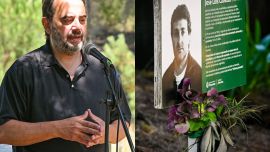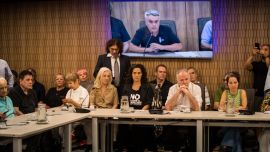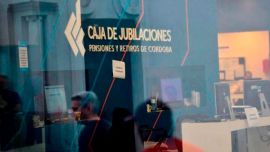Argentina's government repudiated on Tuesday the “harassment” of staff at its nation's embassy in Venezuela following a decision by President Nicolás Maduro to “stop the power supply” at its diplomatic outpost in Caracas.
At a press release, Argentina made “a call to the international community on the importance of enforcing international regulations on diplomatic relations between States”.
In addition to this, it warned the Venezuelan government “on any deliberate action endangering the Argentine diplomatic staff and Venezuelan citizens under protection, reminding it of the State’s obligation to safeguard the facilities of the diplomatic mission against any intrusion or damage and to preserve its calmness and dignity”.
According to Noticias Argentinas, the Venezuelan issue took up much of the Cabinet meeting headed on Tuesday by President Javier Milei, amid the harassment being received by the Argentine Embassy in that country.
In the meantime, Maduro’s government demanded the exit from Venezuela of the diplomatic staff of Argentina as well as Chile, Costa Rica, Panama, Peru, the Dominican Republic and Uruguay, while also ordering the withdrawal of his representatives from those countries.
Given that setting, Foreign minister Diana Mondino was disconcerted about the situation at the Argentine Embassy in Caracas and uncertain about the refugees who have been there since March, including Magalli Meda, head of the campaign and one of opposition leader María Corina Machado’s trusted women.
“Now we have such a complex situation where they’re expelling (…) diplomats and won’t give clearance or not answer or we don’t know what to do with refugees” at the embassy, said Mondino on Monday on television.
“These people have a right to be at our embassy and if our diplomatc should have to leave it, the Venezuelan government has the obligation to let them leave [the refugees] with our diplomats. This is really unheard of”, she added.
What is more, the minister talked about contact with the Venezuelan government to proceed. “We have tried to talk with their Foreign Ministry to see at least what this press release telling us and several countries to leave [Venezuela] is about. What is that? Are we all leaving? When, how?”, she stated.
She also considered the possibility of a rupture between both countries “outrageous”. “Argentina has broken no bonds with Venezuela. If they have, they haven’t let us know yet”, she claimed.
The minister will also travel to Washington, United States, to attend the emergency meeting called by the Organisation of American States (OAS) where a resolution will be debated to urge the Venezuelan President to allow the opposition to count the votes, as confirmed by Noticias Argentinas.
After the imminent diplomatic rupture with Venezuela and the government’s disregarding Maduro’s self-proclaimed triumph at the election on Sunday 28th, presidential spokesman Manuel Adorni revealed that they were negotiating guarantees for the six people who sought asylum in the neighbouring country.
The dialogue is taking place in the context of the 72-hour ultimatum made by the Chavist leader to the Argentine diplomatic delegation to leave the country. Diplomatic sources revealed to Noticias Argentinas that “everything is being assessed” and “that nothing has been defined” yet.
The truth is that from the libertarian administration they claim for the Venezuelan government to “guarantee safe passage for refugees”, though they revealed that “there are no guarantees yet to finalise it in 72 hours”.
The national delegation is headed by Business Representative Andrés Mangiarotti, and completed by the leaders answering to opposition leader María Corina Machado: Pedro Urruchurtu, Magalí Meda, Claudia Macero, Humberto Villalobos, Facundo Martínez Mottola and Omar González.
At his usual press conference, the presidential spokesman that there would be news within the next few hours, while specifiying that “acccording to the [1954] Caracas convention, when diplomats leave, refugees leave as well”. “There is no other decision than to continue to protect them. We’re assessing how the facts will unfold and what the solution is”, he suggested.
The quote mentioned by Adorni is from article XIX of the convention which establishes that “if in case of any rupture of relations the diplomatic representative who has granted asylum must leave the territory, they shall leave with refugees”.
It further specifies that “if the provisions of the previous subsection were not possible for reasons beyond the control of refugees or the diplomatic representative, the latter must deliver them to the see of a third party State that is a Party to this Convention, with the guarantees therein set forth”.
“If the latter were not possible either, they must deliver them to a State that is not a Party hereto and which agrees to maintain asylum. The State must respect said asylum”, it also clarifies.
The options handled by the libertarian administration are, on the one hand, for Maduro to let he refugees travel to Buenos Aires, via the requested safe passage; and on the other hand, for them to be transferred to another embassy of a neighbouring country. The latter possibility is more complex given that the Venezuelan government decided to expel diplomats from Chile, Costa Rica, Panama, Peru, the Dominical Republic and Uruguay after they did not accept the results issued by the CNE National Electoral Council.
Thus and so far, only Bolivia, Brazil, Colombia and Mexico -which have still taken no stance on the election- maintain relations. Given this situation, the OAS has called an emergency meeting on Wednesday at 3 pm to approach the results, in which Mondino will take part.
--TIMES/PERFIL/NA




















Comments